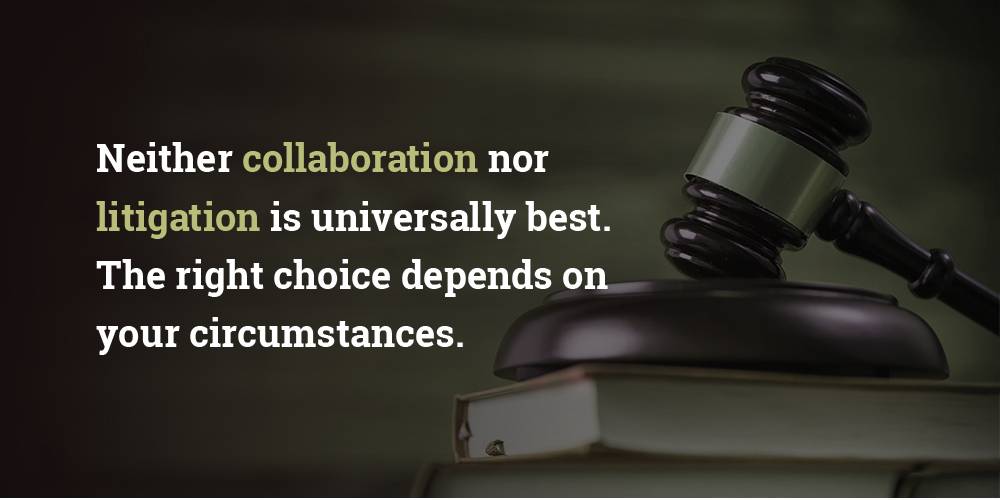630-462-9500
After Hour New Client Telephone Number 630-690-6077
1776 S. Naperville Road, Building B, Suite 202,
Wheaton, IL 60189
What Happens If Collaborative Divorce Fails?
 In Illinois, many couples approach divorce wanting to reduce conflict as much as possible. Collaborative divorce offers a way to resolve issues outside of the courtroom through negotiation. However, not every couple succeeds in this process. When collaboration does not work, it is important to know what happens next.
In Illinois, many couples approach divorce wanting to reduce conflict as much as possible. Collaborative divorce offers a way to resolve issues outside of the courtroom through negotiation. However, not every couple succeeds in this process. When collaboration does not work, it is important to know what happens next.
At The Stogsdill Law Firm, P.C., our Wheaton, IL family law attorneys bring more than 100 years of combined experience to every case. We excel at the collaborative divorce process, but we also offer tough negotiation and litigation when collaborative methods fail.
What Is Collaborative Divorce?
Collaborative divorce is a divorce process designed to avoid courtroom battles. Both spouses agree to manage issues such as property division, child custody, parenting time, and support through negotiation, not litigation.
Each spouse hires an attorney trained in collaborative law. Spouses may also add other professionals such as financial advisors, mental health specialists, or child psychologists to help. All participants sign a collaborative law participation agreement, affirming their commitment to work towards a divorce settlement without going to court.
Under Illinois’ Uniform Collaborative Law Act (750 ILCS 90/), collaborative law has clear rules. If the process succeeds, the couple signs a settlement agreement, which the court can then approve as part of the divorce judgment.
But what if the process does not succeed?
Why Collaborative Divorce Might Fail
Even with hard work and skilled guidance, collaborative divorce is not always successful. Common reasons include:
-
If one spouse feels the other is hiding assets, lying, or not negotiating in good faith, there may not be enough trust for the process to succeed.
-
Some couples discover their disagreements are too deep to solve without help from a judge.
-
If one spouse dominates discussions or the other feels pressured, negotiations may become impossible.
-
When one or both spouses are unwilling to compromise, the process cannot move forward.
-
High net worth cases or disputes over businesses, retirement assets, or real estate sometimes require a judge’s involvement.
When these problems come up, the collaborative process ends. So what happens next?
The "Disqualification Rule" in Collaborative Divorce
A critical aspect of Illinois collaborative law is the disqualification rule. If the collaborative process fails, the attorneys who represent each spouse are not allowed to also represent their clients in divorce litigation.
This rule exists to encourage cooperation and confidentiality during collaboration. It allows people to be honest without being afraid that this honesty could later be used against them in court.
However, this also means that if collaboration fails, each spouse must hire a new attorney to litigate the divorce. There may be additional legal costs because new counsel must review the case from the beginning. And, of course, the divorce process may be delayed while spouses each find another attorney.
For many couples, the disqualification rule is the biggest risk of attempting collaborative divorce.
What Happens Next If Collaboration Ends
If collaborative divorce fails, the case moves into the more traditional avenues of Illinois divorce. There are several possible next steps.
Negotiation Outside the Collaborative Framework
Sometimes, collaboration fails in its formal structure but negotiations can still continue outside of the collaborative agreement. The spouses may work informally through their new attorneys to settle disputes without a full trial.
Mediation
Another possibility is mediation. In Illinois, courts encourage mediation in divorces with young children, but couples can also use mediation for financial issues. A neutral mediator handles discussions and helps spouses reach agreements.
Mediation can also be more flexible and less expensive. Unlike collaborative divorce, mediation does not require attorneys to withdraw if the process fails.
Litigation
Litigation is the most difficult path. Each side presents arguments, evidence, and witnesses. A judge makes decisions about property division, child-related issues, and support.
While litigation can be stressful, it may be the only way to resolve disputes when cooperation breaks down. Having experienced trial attorneys is essential in this stage to ensure your rights are protected.
How to Improve the Chances of Success in Collaborative Divorce
While not every case can succeed in collaboration, there are steps couples can take to improve their chances. To begin with, each spouse should commit to transparency. Next, everybody needs to be realistic about goals. Flexibility and willingness to compromise make success more likely.
If you both agree to be flexible and honest, next you need to choose the right professionals. Attorneys and other professionals can guide the process effectively if they are experienced and committed to the process.
Once you have your attorneys, make sure you address power imbalances early. If one spouse feels disadvantaged, additional support (such as financial advisors or therapists) can level the playing field. Finally, make sure you are emotionally ready. If your conflicts with your spouse are too intense, it may be best to pursue another path from the start.
Our attorneys help clients assess whether collaborative divorce is right for them before beginning, reducing the likelihood of wasted effort.
Is Collaborative Divorce Right for Us?
Couples often want to know which method is "better." The truth is that neither collaboration nor litigation is universally best. The right choice depends on your circumstances.
Collaborative divorce works best for people with some trust, willingness to compromise, and shared goals. If successful, it can be faster, less expensive, and less stressful. Litigation becomes necessary when disputes are too serious or one spouse refuses to negotiate in good faith. In these cases, only a judge can settle a case.
When considering collaborative divorce in Illinois, you should think about the benefits and the risks. The main benefit is the chance to resolve your divorce cooperatively, without the cost and exhaustion of trial. The main risk is that if collaboration fails, you will need to start over with new attorneys.
Before beginning, ask yourself the following questions: Are you and your spouse committed to honesty and openness? Do you trust each other enough to work together in good faith? Are you prepared for the possibility that the process may not succeed?

Contact a Wheaton, IL Family Lawyer
Collaborative divorce can offer couples an opportunity to get divorced respectfully, but it is not always the right fit. Without collaboration, you still have options for moving forward, including mediation and litigation.
At The Stogsdill Law Firm, P.C., our DuPage County, IL collaborative divorce attorneys bring more than a century of combined experience. Whether you are interested in collaboration or litigation, we can help. To discuss your options, call us at 630-462-9500 today.




















